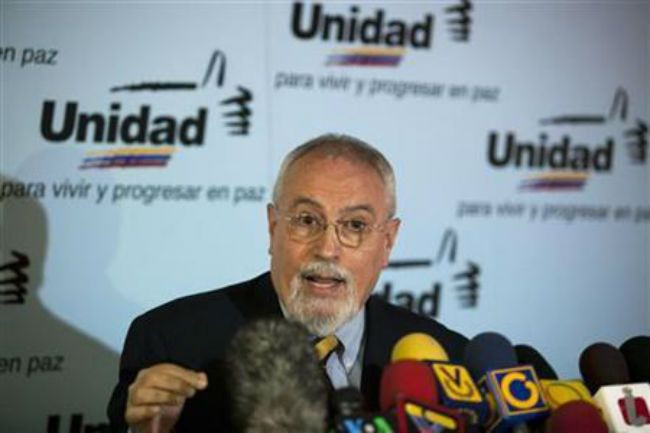
After years of defeats at the ballot box by President Hugo Chavez, Venezuela's opposition supporters used to say the only thing worse than him was their own incompetent leaders.
Now, after a few cherished successes, including three years of hard-won political unity, that bitter comment is seldom heard, according to Ramon Guillermo Aveledo, the brain behind Venezuela's Democratic Unity coalition.
"It's no longer true," said the 62-year-old Venezuelan lawyer, professor and intellectual, who managed to persuade about 30 groupings and their ambitious leaders to put aside egos and in-fighting to unite against Chavez.
"We have advanced. The Venezuelan opposition is not what it used to be," Aveledo added in an interview in Caracas.
The South American nation's opposition coalition is still smarting at defeat by Chavez in the October presidential election. But it is also reflecting on its largest turnout - 6.5 million votes - since he came to power in 1999.
Now they have their eyes set on the December 16 regional governorship elections, where they hope to preserve their leadership of seven of Venezuela's 23 states.
Chavez's candidates hope momentum from October's presidential poll, where the socialist leader won 55 percent versus 44 percent for opposition challenger Henrique Capriles, will enable them to recapture lost territory.
"If we win less (than seven), it's a defeat. If we hold what we have, it's a triumph, and if we win more, it's a major triumph," Aveledo added.
Galvanizing opposition supporters again is a tall order, however, after the crushing disappointment they felt at Capriles' defeat. Aveledo said for the first time there had been genuine belief Chavez would lose the presidency.
"That's why the disappointment is so huge," he said.
CAPRILES IS OPPOSITION "FACE"
In a less than impressive history going up against Chavez, the opposition lost vote after vote in the early years as Chavez held a series of nationwide elections and referendums.
The opposition resorted to massive street protests in 2002 that precipitated a brief, 36-hour coup against Chavez before military loyalists and popular protests helped bring him back.
An oil industry strike, and a boycott of 2005 legislative elections, were other tactics that failed and led many Venezuelans to question opposition leaders' credibility.
But after finally uniting under the Democratic Unity umbrella, the opposition made a comeback with about half the votes in a 2009 election, and then Capriles gave Chavez a closer run in October than any other presidential candidate had.
An opposition commission was analyzing why they had not managed to go the extra mile and unseat Chavez, Aveledo said.
Opposition parties needed to think beyond the electoral cycle, he said, and more towards helping Venezuelans solve their day-to-day problems on a permanent basis.
"We shouldn't think the agenda is simply an electoral one. The country exists every day. What more do we have to do? The election campaign is simply the culmination."
The transformation of Capriles, a 40-year-old state governor, into a national leader during his grueling pre-election tour of Venezuela, has been a major boost for the opposition, Aveledo said.
"Venezuela is a country where 'who' is more important than 'what'. That's why it's so important to have a face," he said.
Capriles is seeking re-election in Miranda state at the December 16 vote, but faces a strong challenge from a Chavez heavyweight - former vice-president Elias Jaua. A poll in Venezuela media on Tuesday, however, gave Capriles a comfortable 22 percent lead.
© Thomson Reuters.




